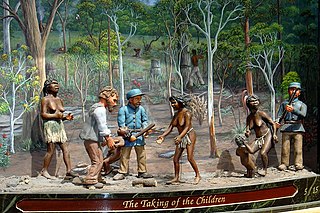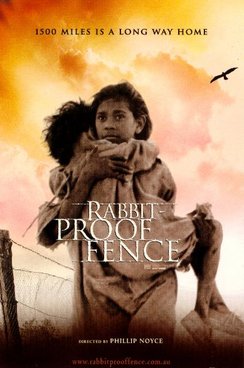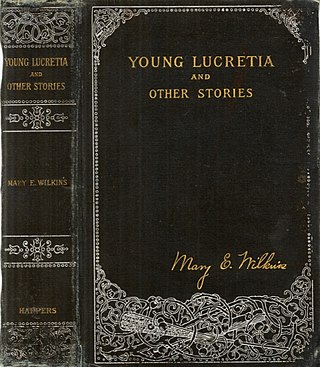
The Stolen Generations were the children of Australian Aboriginal and Torres Strait Islander descent who were removed from their families by the Australian federal and state government agencies and church missions, under acts of their respective parliaments. The removals of those referred to as "half-caste" children were conducted in the period between approximately 1905 and 1967, although in some places mixed-race children were still being taken into the 1970s.
Sweep is a series of young adult fantasy novels written by Cate Tiernan, the first of which, Book of Shadows, was published in 2001. The series follows a teenage girl, Morgan Rowlands, who discovers she is the descendant of a long line of witches, and possesses powerful magic of her own.

Rabbit-Proof Fence is a 2002 Australian drama film directed and produced by Phillip Noyce based on the 1996 book Follow the Rabbit-Proof Fence by Doris Pilkington Garimara. It is loosely based on a true story concerning the author's mother Molly Craig, as well as two other Aboriginal girls, Daisy Kadibil and Gracie, who escaped from the Moore River Native Settlement, north of Perth, Western Australia, to return to their Aboriginal families, after being placed there in 1931. The film follows the Aboriginal girls as they walk for nine weeks along 1,500 miles (2,400 km) of the Australian rabbit-proof fence to return to their community at Jigalong, while being pursued by white law enforcement authorities and an Aboriginal tracker. The film illustrates the official child removal policy that existed in Australia between approximately 1905 and 1967. Its victims now are called the "Stolen Generations".

The Joy Luck Club is a 1989 novel written by Amy Tan. It focuses on four Chinese immigrant families in San Francisco who start a club known as The Joy Luck Club, playing the Chinese game of mahjong for money while feasting on a variety of foods. The book is structured similarly to a mahjong game, with four parts divided into four sections to create sixteen chapters. The three mothers and four daughters share stories about their lives in the form of short vignettes. Each part is preceded by a parable relating to the themes within that section.

Kevin Webster is a fictional character from the British ITV soap opera Coronation Street. Portrayed by Michael Le Vell, the character first appeared on-screen during the episode airing on 19 October 1983. Le Vell was suspended from the soap in February 2013 due to allegations of sexual offences, with scenes he had already filmed cut from broadcast. Le Vell was found not guilty of all charges in September 2013, and briefly returned in early 2014, before taking another 3-month break from the show and returning once again.

Janine Carter is a fictional character from the BBC soap opera EastEnders, introduced in 1989. The character was played by Rebecca Michael from 1989 to 1993, Alexia Demetriou from 1993 to 1996, and Charlie Brooks from 1999 to 2022. Brooks initially departed on 7 May 2004. She returned for a three episode guest stint in April 2008 before returning permanently on 18 December of that year. Brooks later took a break from September 2012 until April 2013, then departed again on 20 March 2014. In April 2021, it was announced that Brooks would reprise the role once again and return later in the year. She returned on 6 September 2021. It was announced on 24 September 2022 that Brooks had only agreed to reprise the role for 12 months and would depart again at the conclusion of her storyline, with her final scenes airing on 26 December 2022.
Sally Forth is a daily comic strip created by Greg Howard in 1982 and distributed by King Features Syndicate, focusing on the life of a white American middle-class mother at home and work. Sally's name is a play on words: "to sally forth" means to set out on an adventure.

Cindy Williams is a fictional character from the BBC soap opera EastEnders, that has been played by four actresses since being introduced in 1998. Cindy is brought up by her maternal grandmother and aunt off-screen after her mother, Cindy Beale, supposedly dies off-screen in prison while in labour. In June 2023, Cindy Beale made an appearance in France alongside Ian Beale which confirms she had not died during childbirth, she went into Witness Protection. Still unknown to Cindy Jr. Ella Wortley and Cydney Parker both portrayed the role from 1998 to 1999, followed by Eva Sayer in a brief appearance in 2007.

Dawn was a 1990 novel started by V. C. Andrews and finished by Andrew Neiderman after her death. It is the first of five books in the Cutler series.

Main Street is a children's novel series by Ann M. Martin aiming at age group 8–12. It was published between 2007 and 2011. The story revolves around two sisters, Ruby and Flora Northrop, who move to the small town Camden Falls to live with their grandmother after the sudden death of their parents. The books tell us about the girls' new journey and adaptation in a new town and new people with old memories, and some with rather dubious ones. There, they make new friends like Olivia and Nikki. Olivia's grandmother owns a store with Ruby's and Flora's grandmother.

Radiance is a 1998 Australian independent film. It is the first feature film by Aboriginal director Rachel Perkins about three indigenous sisters who reunite for their mother's funeral. The film is based on the 1993 play written by Louis Nowra.

Young Lucretia and Other Stories is a collection of thirteen short stories by Mary Eleanor Wilkins Freeman. The stories were originally published individually in literary magazines such as Harper's Young People and St. Nicholas Magazine between 1887 and 1892. They were later collected and reprinted by Harper & Brothers in 1892. These stories primarily feature children who learn moral lessons after misbehaving.

Annaliza is a 2013 Philippine family drama television series based on the 1980 television series that starred Julie Vega, together with Alicia Alonzo, Renato del Prado, Augusto Victa and Daria Ramirez. The series aired on ABS-CBN's Primetime Bida evening block and worldwide on The Filipino Channel from May 27, 2013 to March 21, 2014, replacing Little Champ, and was replaced by Mirabella. It starred Andrea Brillantes for her first lead role, Zanjoe Marudo, Denise Laurel, Kaye Abad, Patrick Garcia and Carlo Aquino.

If There Be Thorns is a 2015 television film based on the best-selling 1981 novel of the same name. It premiered on April 5, 2015 and was produced by Lifetime. Seeds of Yesterday is the sequel film based on the novel of the same name.
Doreen Maude Kartinyeri was an Ngarrindjeri elder and historian, born in the Australian state of South Australia. She played a key role in the Hindmarsh Bridge controversy and made many contributions to Indigenous activism.











